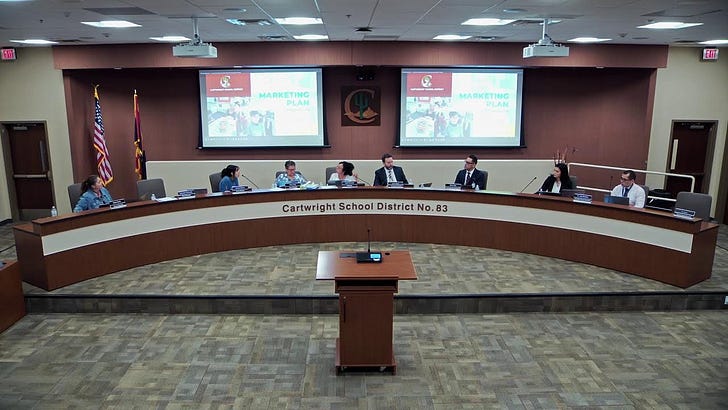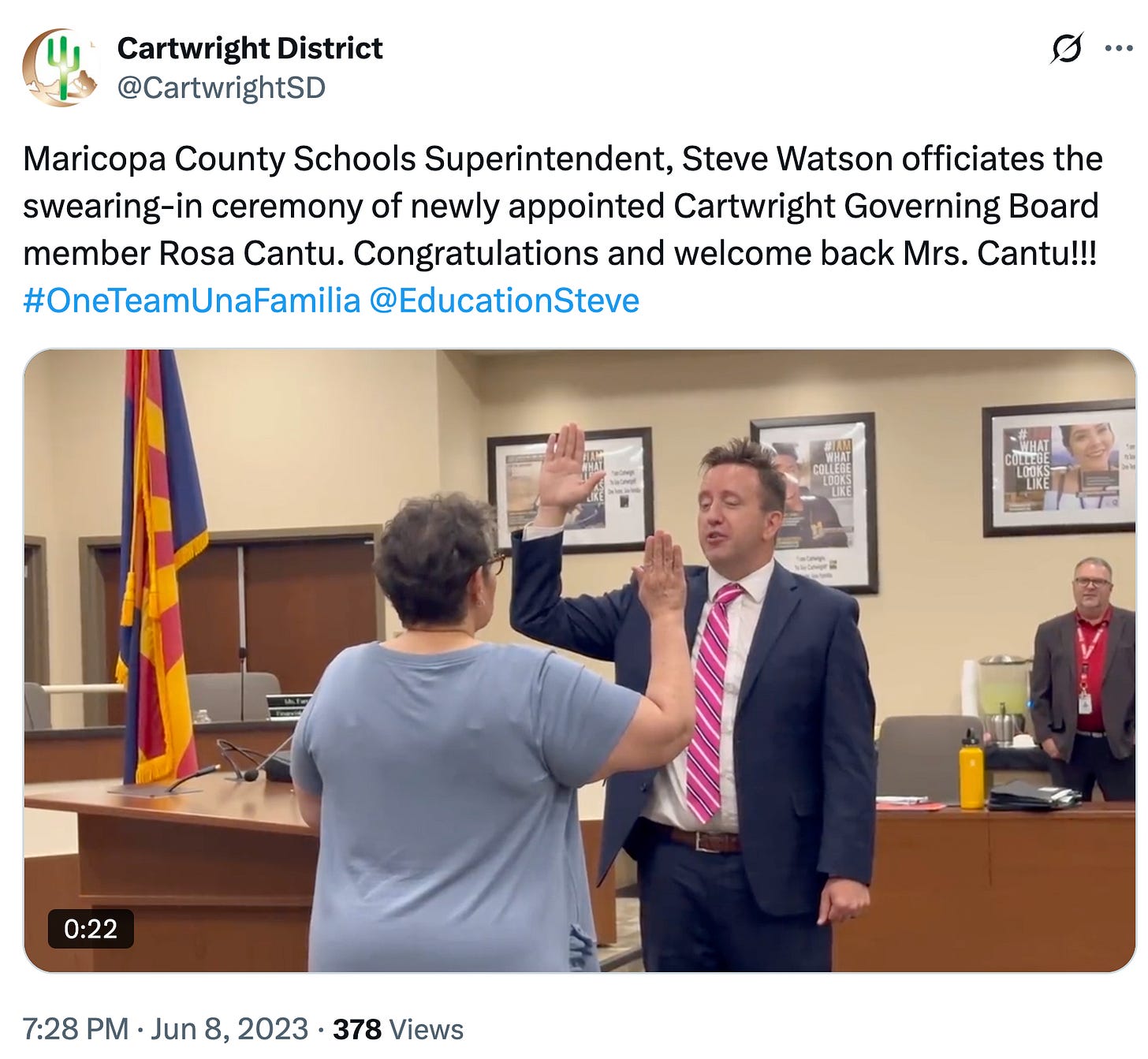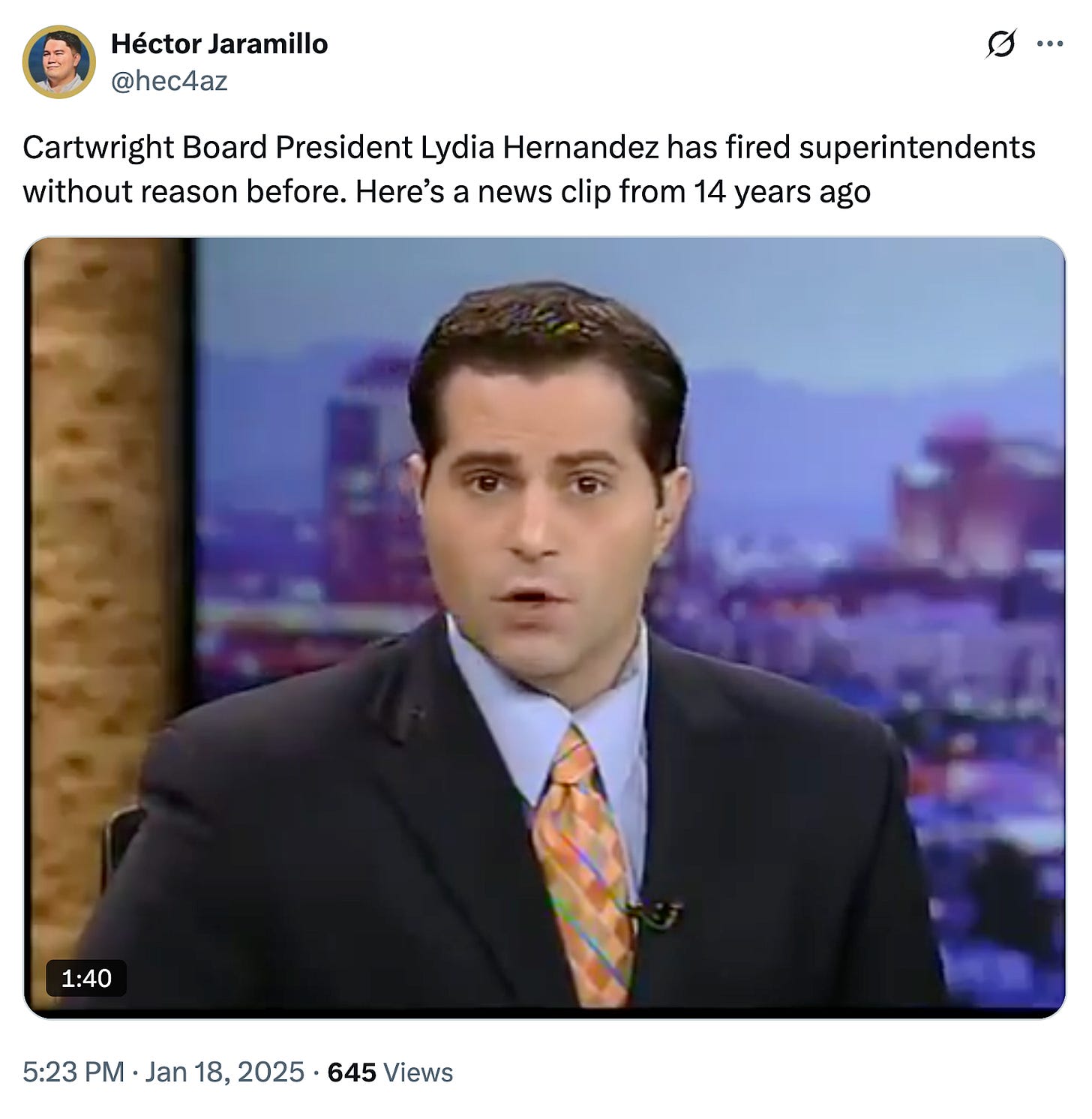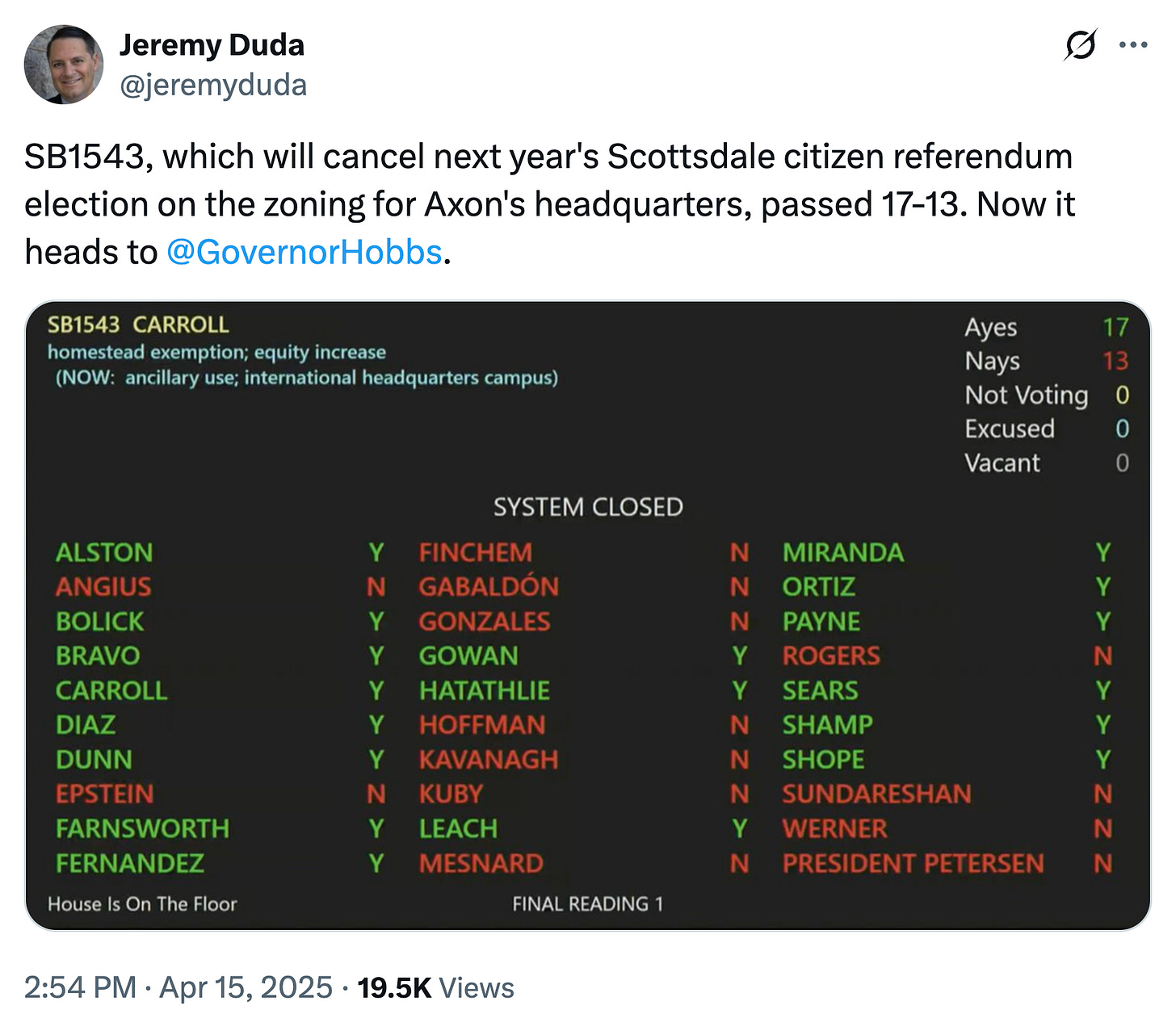
Arizona’s most dysfunctional school board?
Nepotism, mismanagement and chaos … Stacking the committee … And they got a new lawyer.
Within three minutes of starting last week’s Cartwright Elementary School District Governing Board meeting, the school board members were screaming at each other and slamming the gavel.
The item that had them at each other’s throats? The adoption of the consent agenda.
School board meetings are often heated affairs. But since last year’s election, the West Valley’s Cartwright school board has devolved into near-total dysfunction.
And the fights have nothing to do with test scores, declining enrollment, DEI policies or what books students can read — it’s all about the adults.
It’s a series of personality clashes that have spiraled into an all-out battle for control of the school district — how it’s run, and who’s running it.
And the battle is raging.
At last week’s board meeting, for example, the board members shouted at each other until they eventually just shut down the meeting without finishing the day’s business or listening to members of the public who showed up and waited several hours for a chance to address the board.
But the board members still had time to threaten to complain about each other to the Maricopa County Attorney’s Office. (And it wouldn’t be the first complaint to a law enforcement agency regarding the district’s governing board — nor likely the last.)
Here’s a clip to give you a feel.
The Power Shift
The tenor of Cartwright’s politics took a nosedive after the November election, when voters elected Cassandra Hernandez to the board, the daughter of fellow Cartwright school board member (and Democratic state lawmaker) Lydia Hernandez.
The mother-daughter duo formed a new majority voting bloc with longtime Hernandez ally Rosa Cantu.
The two other board members, Denice Garcia and Jennifer Romero, have basically refused to vote on anything ever since.
They argue the board is illegitimate because Cassandra is not eligible to serve, thanks to a law that bars close family members from serving on a school board together.
A constituent recently filed a lawsuit attempting to kick her off the board. The duo was served at a school board meeting, and an evidentiary hearing is scheduled for next week.1
“Man, it’s just like a big old soap opera, isn’t it?” Garcia told us, noting she doesn’t relish her new position as the board’s “disruptor,” but she won’t abide by the “unethical” way the new majority is running the show.
Almost immediately upon taking control, the new board majority put the district’s interim superintendent on paid leave and hired a new acting superintendent: former Republican Maricopa County Schools Superintendent Steve Watson.
Watson was an odd choice considering his tenure as the county’s top school elected official was riddled with controversy about financial mismanagement and he doesn’t have a superintendent certification, an administrator's certification or a Ph.D., as many superintendents do.
Now, Watson and the new board majority are clearing house at Cartwright, putting several top administrators on leave, including the district’s chief financial officer, executive director of human resources and the former interim superintendent.
The accusations have reached something of a fever pitch. There’s a decade of grievances, allegations and innuendo all piled on top of each other, but the basic lay of the land is:
Watson and the new board majority are pointing the finger at past board members, arguing there was a history of financial mismanagement, nepotism and poor decisions that they’re now trying to clean up.
Garcia and Romero, the two dissident board members, argue Lydia is consolidating her power as school board president by intimidating and investigating her perceived enemies and hiring Watson to do her dirty work.
The Disruptor Bloc
Garcia, the previous president of the board, says she knows that she has looked a little crazy during the last few months of school board meetings with her frequent shouting, refusing to vote and generally causing a ruckus. But it has to be done, she argues.
“I may sound like I've lost my mind at a board meeting, and I'm real close to it, because I just can't believe that they continue to do this and wipe their hands clean,” she said.
The new majority has repeatedly broken open meetings laws, she said, not to mention holding illegal board meetings, since it’s questionable whether Cassandra is even allowed to serve. Garcia has filed two or three separate complaints with the Attorney General’s Office about open meetings violations, but the Hernandez bloc keeps breaking the rules anyway.
Even the way Watson was hired was unethical, Garcia argues. Lydia offered him the job before she took over as board president, even though Watson didn’t have the proper certifications.
“It all started in December — I was the board president, and Lydia Hernandez went without consultation, without notifying me, and offered Steve Watson the job of superintendent. He is unqualified to hold that position. He has zero certification. He has no superintendent certification. He has no administrative certification.”
(Watson tells us he’s currently working on his superintendent certificate and notes that as the elected county schools chief, he was also superintendent of the county Accommodation School District, which serves kids in juvenile detention, behavioral health facilities or those experiencing homelessness.)
And when he was the county schools chief, Watson appointed Cantu to the board. Then Cantu voted for him to become the district’s superintendent, which seems like a conflict of interest, Garcia argues.
And Garcia accuses Watson of employing intimidation tactics and placing top officials on leave without due process or even a public rationale.
The new board launched an investigation into the contract of former interim superintendent Ema Jáuregui, who is now on leave, but has refused to provide any updates on that investigation. In the meantime, the district is now paying both her and Watson to do the job.
And it’s not the first time Lydia and Cantu, who have served on the board together off and on for more than a decade, have gotten rid of a popular superintendent without cause.
Garcia also hasn’t gotten answers about why the CFO or HR head were recently put on leave. (And for what it’s worth, Watson wouldn’t tell us anything about the cases, either.)
“I have a few people who have reached out to me anonymously, because everyone has been intimidated, and they are in fear of retaliation from Lydia Hernandez and Steve Watson,” she said.
The New Guard’s Case
Meanwhile, the new majority and superintendent have been digging into the financials of the past board’s actions and coming up with all sorts of dirt.
“We've got a lot of issues,” Watson said. “We've got improper retention bonuses, we've got some nepotism issues, we've got some fiscal mismanagement issues… It's kind of just been a place for, you know, bringing people in and adding positions more than it is focusing on the education of our students.”
Just last week, Watson sent an email to the state Attorney General’s Office, the Maricopa County Attorney’s Office and the Arizona Superintendent of Public Instruction notifying them of potential illegal use of federal funds under the old board and requesting an audit.
Basically, the district appears to have paid out federal Covid funds as bonuses for educators and administrators as part of a “longevity pay program,” including to former employees who were no longer working at the district.
“For example, one individual who was no longer with the district received a payment of $26,744,” Watson said in the letter. “…Several individuals earning in excess of $100,000 received significant bonuses, including one who was issued a single payment exceeding $43,000.”
And that’s just the tip of the iceberg. In February, the board found out it had recently paid $2.1 million in fees and penalties to the IRS for failing to file required forms in 2017 and 2023. The board wasn’t even aware of the fines until this year, and district officials had already paid the bill by the time the board found out.
Had he been aware beforehand, Watson could have leveraged his relationships with members of Arizona’s congressional delegation to potentially get some relief, he argued.
Meanwhile, the district has lost about 10,000 students in the last decade, yet added positions at the district office, he said.
Now it’s time to right-size the ship.
They Agree on the Problem
Then there’s the allegations against former Cartwright Governing Board member (and current Democratic state lawmaker) Anna Abeytia, whom Cassandra defeated in last year’s election.
Documents show that, in one of her final acts on the board, Abeytia and other board members voted to hire her significant other, Ricardo Serna, as a landscaper at the district. He’s also a political consultant who worked for her campaign.
Watson points to it as a prime example of nepotism that he’s trying to root out at the district.
“If that was the only issue of a friend or a family member or somebody who knew somebody being hired for a position, maybe we could have a conversation about one thing,” he said. “… But there seems to have been a pattern of just bringing in your friends, your cronies, your family members, to come in and do some work.”
Abeytia told us that in hindsight, she maybe should have abstained from that vote. But it’s a part-time gig that pays barely above minimum wage, and since they’re not legally married, she didn’t think she had to.
But she agrees with Watson on one thing: Nepotism and favoritism are a problem in the district. But in her view, it’s the mother-daughter Hernandez duo who are perpetuating it.
And there’s the rub — both factions insist they’re the ones rooting out corruption.
The new board majority says they’re cleaning house by exposing years of insider dealing and fiscal mismanagement. The minority says they’re fighting a hostile takeover built on personal loyalty and legal gray areas.
Unfortunately for the parents, teachers and students in Cartwright, it looks to us like both sides are correct.
Livingston’s law: House and Senate appropriations committees agreed to keep funding a program that pays parents of children with developmental disabilities, but added new parameters authored by Republican Rep. David Livingston that cut reimbursements in half and take funding from other state programs, the Republic’s Mary Jo Pitzl reports. Republican Rep. Julie Willoughby introduced a less harsh version of an extension bill with Democratic support, but Livingston added three more Republicans to his committee to ensure his version of the bill was passed. Gov. Katie Hobbs called the bill a “nonstarter.”
Buy the world a Coke: Hobbs vetoed a bill that would have blocked people who use food stamps from buying soda, Capitol scribe Howie Fischer reports. RFK, Jr came to the Capitol to lobby for the bill as part of his Make America Healthy Again campaign, but Hobbs said the bill would have turned food stamp beneficiaries into a “new underclass of grocery shoppers.”
Data in a time warp: Arizona U.S. Sens. Ruben Gallego and Mark Kelly joined Nevada lawmakers to introduce legislation that would modernize the federal housing voucher system, per Axios’ Jessica Boehm. The U.S. Department of Housing and Urban Development uses Census data from 2000 to calculate the number of Housing Choice Vouchers (which used to be called Section 8) cities get, and that’s causing a shortage in booming places like Phoenix and Las Vegas. The bill would allocate an additional $2 billion to affordable housing, but it faces an uncertain future in Trump’s fund-slashing administration.
New genre of journalism?: The Associated Press interviewed older Arizona voters about the Trump administration’s tariffs, just a week after the Washington Post did the same. The upshot both times is that Republican voters are still supporting President Donald Trump, regardless of the economic worries the tariffs cause. Meanwhile, Trump has doubled down on his attempt to bar the AP from reporting in the White House by limiting all wire services’ access to the White House after the courts told him he couldn’t bar just one news source he doesn’t like. The AP is going back to court to try to stop the new policy.
Keg standstill: A group of brewery owners told Hobbs and Democratic U.S. Rep. Greg Stanton that Trump’s tumultuous tariffs are hurting their bottom lines, specifically because of tariffs on aluminum and steel, KJZZ’s Camryn Sanchez reports. Stanton wants his Republican congressional colleagues to do something about the Trump-imposed tariffs, and Hobbs said Congress needs more bipartisanship to fix the economic pitfalls. Both agreed that beer should bring the parties together.
Buy us a beer?
A pot problem: Both medical and medicinal marijuana sales dropped 10% last year, and medical sales are especially tanking, per the Arizona Mirror’s Jim Small. Recreational weed sales fell by $43 million since last year, while medical purchases dropped by $114 million, and that impacts the community colleges, public safety personnel and first responders that Arizona’s weed tax puts funding toward.
All tapped out: Months after Kari Lake’s failed run for U.S. Senate ended, her campaign has racked up more than $1 million in debt, the Republic’s Ronald J. Hansen reports. The campaign still owes money to vendors for text messaging services, fundraising services, online advertising and lots of other things. On top of that, Lake still doesn’t have a set gig in the Trump administration.
As we were combing through public records and documents for today’s story about Cartwright, we stumbled on this gem of an email from former Cartwright attorney Jeff Stratman.
It was in a chain of emails discussing that “longevity pay program” that’s now in the hands of law enforcement agencies.
We wrote all about the mother-daughter drama — including Lydia’s attempt to pass legislation to protect her daughter’s position on the board — last month in the Education Agenda.
















Arizonans have some experience living under authoritarianism. TG for Katie Hobbs.
"Livingston added three more Republicans to his committee to ensure his version of the bill was passed."
Confrontational way to say everyone's equal but sure